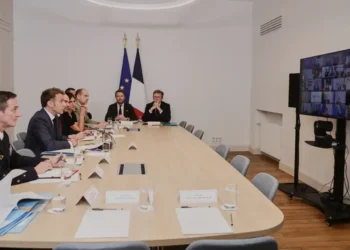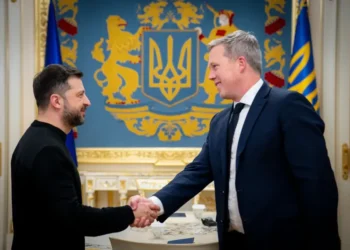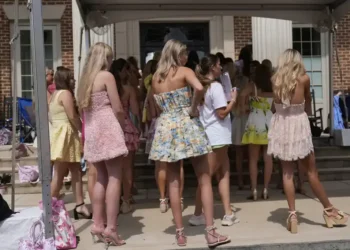Ukraine’s ‘Bachelor’ Features Double Amputee as Veterans Embrace New Lives Post-Injury
Amid the challenges of war, thousands of Ukrainian soldiers with life-altering injuries are redefining relationships, intimacy, and self-acceptance. The rise in casualties has brought critical attention to overlooked issues like sexual rehabilitation and body confidence.
A Soldier’s Journey: Love, Loss, and Rediscovery
When 35-year-old combat medic Tetyana Tsymbaliuk woke up in a hospital after losing her leg to a battlefield injury, her boyfriend was waiting with flowers and a proposal. She declined, fearing she would be a burden.
“I realized that before amputation, I was more attractive. I wasn’t sure I could fulfill my role as a wife,” Tsymbaliuk shared.
Her story reflects the emotional struggles faced by the nearly 370,000 Ukrainian soldiers wounded since Russia’s 2022 invasion, many of whom have undergone amputations. Despite physical and psychological rehabilitation programs, sexual rehabilitation remains a taboo subject, with little formal support available.
A Missing Conversation: Sexual Rehabilitation in Ukraine
While Ukraine has advanced in physical and mental health care for veterans, discussions about sexual health are still rare. Military psychologist and sexologist Hanna Revunets says that societal discomfort with the topic hinders progress.
“We don’t have a culture of openly discussing sex, even with partners,” Revunets explained. “Veterans rarely bring it up unless they’ve built significant trust.”
Revunets highlights the absence of official protocols for sexual rehabilitation, leaving doctors unprepared to address such issues.
“Doctors think I’m crazy when I emphasize its importance. But sexual health is vital for mental and emotional well-being,” she said.
Revunets works with veterans to understand their physical and emotional challenges, offering tailored advice ranging from medication to psychological support.
Veterans Speak Out: “I Was Told to Have Sex, But Not How”
In 2023, Ukrainian nonprofit Veteran Hub conducted interviews with 39 injured veterans and their partners to explore their post-injury sex lives. Many shared that physical changes made intimacy more complex, requiring preparation and adaptation.
One veteran noted a lack of guidance:
“Doctors told me to have sex but didn’t explain how. We’re learning by word of mouth.”
To address this gap, Veteran Hub created a guide to help injured veterans restore their sexual lives. Project manager Kateryna Skorohod stressed the importance of addressing these concerns as part of broader rehabilitation:
“After physical recovery, people want to know if they can still swim, ski, date, or have sex. These questions need answers.”
The Role of Partners: Balancing Care and Intimacy
For many veterans, the journey back to intimacy also involves their partners, who often become primary caregivers.
“Ukrainian society expects wives to care for their husbands entirely, which leaves little room for exploring intimacy,” said Olga Serdyuk, head of a sexual education program at the Recovery rehabilitation network.
Recovery launched a course, Sexual Life, to train medical professionals on how to address sexual rehabilitation. Serdyuk emphasized that even those with severe injuries can find fulfillment:
“Intimacy isn’t just physical; it’s about exploring fantasies, understanding your body, and embracing new forms of pleasure.”
Breaking Barriers on Ukrainian Television
Discussions about disabilities gained mainstream attention when 26-year-old veteran Oleksandr Budko, a double amputee, starred as the lead on Ukraine’s The Bachelor.
In a November episode featuring an intimate scene, 2.8 million viewers tuned in, making it the most-watched program of the day.
“This was the first time a Bachelor with visible amputations was featured,” said producer Anna Kalyna. “We didn’t know how the audience would react, but it was a success.”
Budko’s participation challenged stereotypes. On Instagram, he shared:
“My prostheses don’t define me. I’m worthy of love and a happy life, just like anyone else.”
Veterans Choosing Life Over Suffering
Many veterans are finding ways to reclaim their lives. Infantry commander and osteopath Oleksandr Batalov, who lost his leg in combat, credited his wife’s unwavering support for his recovery.
“At first, I didn’t want anyone to see me. But I chose life, not suffering,” Batalov said.
Batalov is now training to help others, advocating for more specialists in sexual rehabilitation.
“If you’ve survived, you must live fully,” he said.
Love Triumphs: Tsymbaliuk’s Happy Ending
After months of rehabilitation in Germany and Ukraine’s Superhumans Center, Tsymbaliuk found strength in love. Her boyfriend proposed again, and this time, she said yes. Four months ago, the couple welcomed their first child.
“I’m not hiding my prosthetic. I’m living a full life. And I’m happy,” she said.
A Call for Change
As Ukraine navigates the challenges of war, the stories of veterans like Tsymbaliuk and Budko highlight the need for a more comprehensive approach to rehabilitation—one that includes sexual health.
By fostering open discussions and providing resources, Ukraine can help its heroes rebuild their lives, not just survive their injuries.
This article was rewritten by JournosNews.com based on verified reporting from trusted sources. The content has been independently reviewed, fact-checked, and edited for accuracy, neutrality, tone, and global readability in accordance with Google News and AdSense standards.
All opinions, quotes, or statements from contributors, experts, or sourced organizations do not necessarily reflect the views of JournosNews.com. JournosNews.com maintains full editorial independence from any external funders, sponsors, or organizations.
Stay informed with JournosNews.com — your trusted source for verified global reporting and in-depth analysis. Follow us on Google News, BlueSky, and X for real-time updates.













